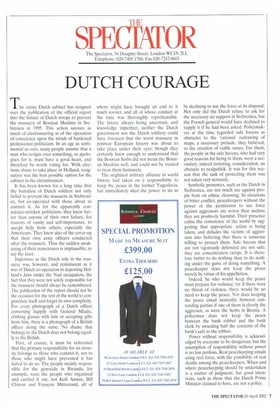DUTCH COURAGE
The entire Dutch cabinet has resigned over the publication of the official report into the failure of Dutch troops to prevent the massacre of Bosnian Muslims in Srebrenica in 1995. This action savours as much of electioneering as of the operation of conscience upon the minds of hardened professional politicians. In an age as sentimental as ours, many people assume that a man who resigns over something, or apologises for it, must have a good heart, and therefore be worth voting for. With elections about to take place in Holland, resignation was the best possible option for the cabinet in the circumstances.
It has been known for a long time that the battalion of Dutch soldiers not only failed to prevent the massacre in Srebrenica, but co-operated with those about to commit it. As for the apparently conscience-stricken politicians, they knew better than anyone of their own failure, for reasons of vanity and self-importance, to accept help from others, especially the Americans. They knew also of the cover-up that their own army officers conducted after the massacre. Thus the sudden awakening of their consciences is implausible, to say the least.
Inglorious as the Dutch role in the massacre was, however, and reminiscent as it was of Dutch co-operation in deporting Holland's Jews under the Nazi occupation, the fact that they were not solely responsible for the massacre should always be remembered. The publication of the report should not be the occasion for the rest of the world to congratulate itself and forget its own complicity. For every photograph of a Dutch officer consorting happily with General Mladic, clinking glasses with him or accepting gifts from him, there is a photograph of a British officer doing the same. No shame that belongs to the Dutch does not belong equally to the British.
First, of course, it must be reiterated that the primary responsibility for an atrocity belongs to those who commit it, not to those who might have prevented it but failed to do so. The people mainly responsible for the genocide in Rwanda, for example, were the people who organised and carried it out, not Kofi Annan, Bill Clinton and Francois Mitterrand, all of whom might have brought an end to it much sooner, and all of whose conduct at the time was thoroughly reprehensible. The future always being uncertain, and knowledge imperfect, neither the Dutch government nor the Dutch soldiery could have foreseen that the worst massacre in postwar European history was about to take place under their eyes; though they certainly knew enough to understand that the Bosnian Serbs did not mean the Bosnian Muslims well, and could not be trusted to treat them humanely.
The mightiest military alliance in world history had taken on a responsibility to keep the peace in the former Yugoslavia, but immediately shed the power to do so by declining to use the force at its disposal. Not only did the Dutch refuse to ask for the necessary air support in Srebrenica, but the French general would have declined to supply it if he had been asked. Policymakers at the time regarded safe havens as obstacles to the 'rational' redrawing of maps, a necessary prelude, they believed, to the creation of viable states. For them, the people in the safe havens, who had very good reasons for being in them, were a secondary, indeed irritating, consideration, an obstacle to realpolitik. It was for this reason that the task of protecting them was not taken very seriously.
Symbolic presences, such as the Dutch in Srebrenica, are not much use against people bent on ethnic cleansing. In situations of bitter conflict, peacekeepers without the power or the permission to use force against aggressors are worse than useless; they are positively harmful. Their presence calms the conscience of the world by suggesting that appropriate action is being taken, and deludes the victims of aggression into believing that there is someone willing to protect them. Safe havens that are not vigorously defended are not safe; they are concentration camps. It is therefore better to do nothing than to do nothing under the guise of doing something. A peacekeeper does not keep the peace merely by virtue of his appellation.
Indeed, he who would keep the peace must prepare for violence; for if there were no threat of violence, there would be no need to keep the peace. Nor does keeping the peace entail neutrality between contending parties if one of them is clearly the aggressor, as were the Serbs in Bosnia. A policeman does not keep the peace between the bank robber and the bank clerk by awarding half the contents of the bank's safe to the robber.
Power without responsibility is acknowledged by everyone to be dangerous; but the assumption of responsibility without power is no less perilous. Real peacekeeping entails using real force, with the possibility of real deaths among the peacekeepers. When and where peacekeeping should be undertaken is a matter of judgment; but good intentions, such as those that the Dutch Prime Minister claimed to have, are not a policy.






































































 Previous page
Previous page